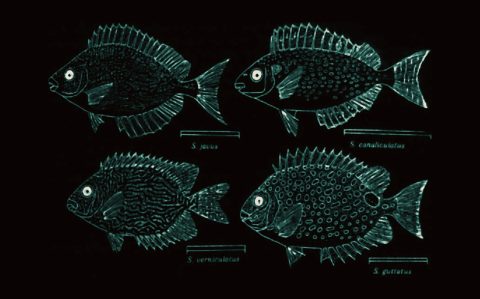The hero of Tomás’s story is a fish, slithery and luminous, its design poached from page 308 of Fishes of the Maldives, a donated textbook which Tomás has propped open with his elbow amid a riot of colored pencils. The students are creating stories in three images––beginning, middle, and end––in the style of a miniature comic book. In two hours, I’ll pitch the alternative declension thesis, antithesis, and synthesis, and this will go exactly as well as might be expected with an audience of nine-year-olds.
In the first panel, Tomás sketches his protagonist, neon yellow and navy button eyes with a maze of popsicle-blue scales, occasionally consulting the reference text. He asks about the Dhivehi translation beneath the English section, and Rahad, who has been drawing a robot in a carefully curated palette of greys, ambles over from his adjacent desk to help. He recognizes something in the text, something like his own language, the right-to-left, the delicate curls of the script, but ultimately shakes his head and declares it nonsense. We’ve just sampled the poetry of Lewis Carroll this week and, as a result, many things are currently nonsense.
Beneath the Latin name (Siganus Lineatus) and the English name (Goldlined Rabbitfish) is the local name (Thammas), which is close enough to Tomás to spark a fourth-grade chain reaction of etymological hearsay resulting in Tomás’s nickname being Rabbitfish by recess.
There, just beyond the peeling paint of a goalpost, I see the softly bent shapes of Tomás’s limbs hunched intently around a cell phone, a bit of contraband he must have borrowed from Esau. On the screen of the phone––swiftly confiscated sans fuss––Tomás has opened a private browser search for “cool facts about rabbitfish.”
#
The second panel of Tomás’s story shows the fish (whom he’s named Pajaro) looking up toward the ovaloid ghost of a boat. In the water, his fellow fish are a frenzy of bubbles and panic. This is what I think about in traffic.
The salary of elementary school teachers in certain places is no more a secret than average rent prices in those same places, so at 4:30, I meet Sasha at the public library for a tutoring session. She’s about to be the first member of her family to graduate high school, and is gunning for a scholarship with an essay titled “The Biopolitics of Aquaculture.”
As one of a family of fishermen (she’s apparently unfazed by the genderedness of the expression), she’s recently grown curious about why animal rights so rarely extend to the water, but today she has it figured out:
“You can’t cuddle a fish.”
“That’s true,” I say.
The nature of our tutoring arrangement is that Sasha pays what she can. Today she can’t. “However,” she says, with the flourish of a magician presenting a torn twenty-dollar bill, miraculously reassembled, “I can pay you in lobster. Worth a lot more than the cash.”
When we get to Sasha’s car, a shoebox––larger than a shoebox though, a box for kneehigh boots––is rattling on the backseat. It had not occurred to me that the thing might be alive. For a moment I’m unsettled by my own transparency, that Sasha brought it here knowing I’d say yes.
“It’s inhumane to boil a lobster,” Sasha tells me. “They don’t pass out from shock like we do. They feel pain until they die.” She directs me to a helpful instructional video helmed by an enthusiastic white-jacketed man in a very white kitchen.
To kill a lobster, you place it on a flat surface, grip it by the body as it thrashes, and drive the tip of a chef’s knife through the cervical groove and the rocklike shell of the carapace, beneath which everything is impossibly soft and clear.
#
A cool fact about the rabbitfish is that it can survive up to 12 years in captivity. Young rabbitfish stick to their schools for protection, and also food.
In the final panel of Tomás’s story, Pajaro has emerged from the water. The fish ascends through the air, fins spread like the wings of a Cessna, snub-nosed snout aimed skyward. In the background, Tomás has meticulously drawn a fishing boat. On the deck, a stick-figure fisherman shouts via word bubble: “GET BACK HERE YOU FISH!!!” The slant of the fisherman’s brows suggests that he is irate at having been foiled by his ichthyoid prey.
The story ends with the rabbitfish suspended midair: resplendently free, but in a place where it’s impossible to breathe.


